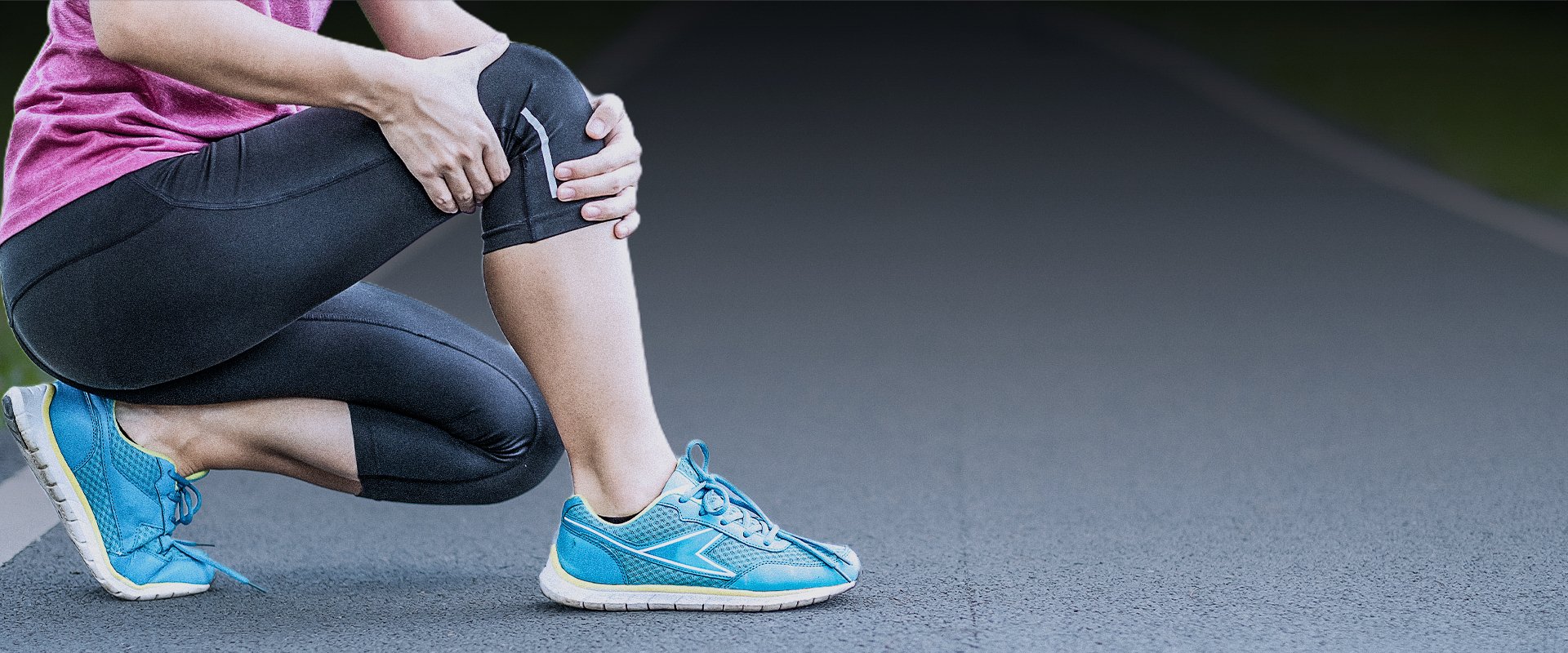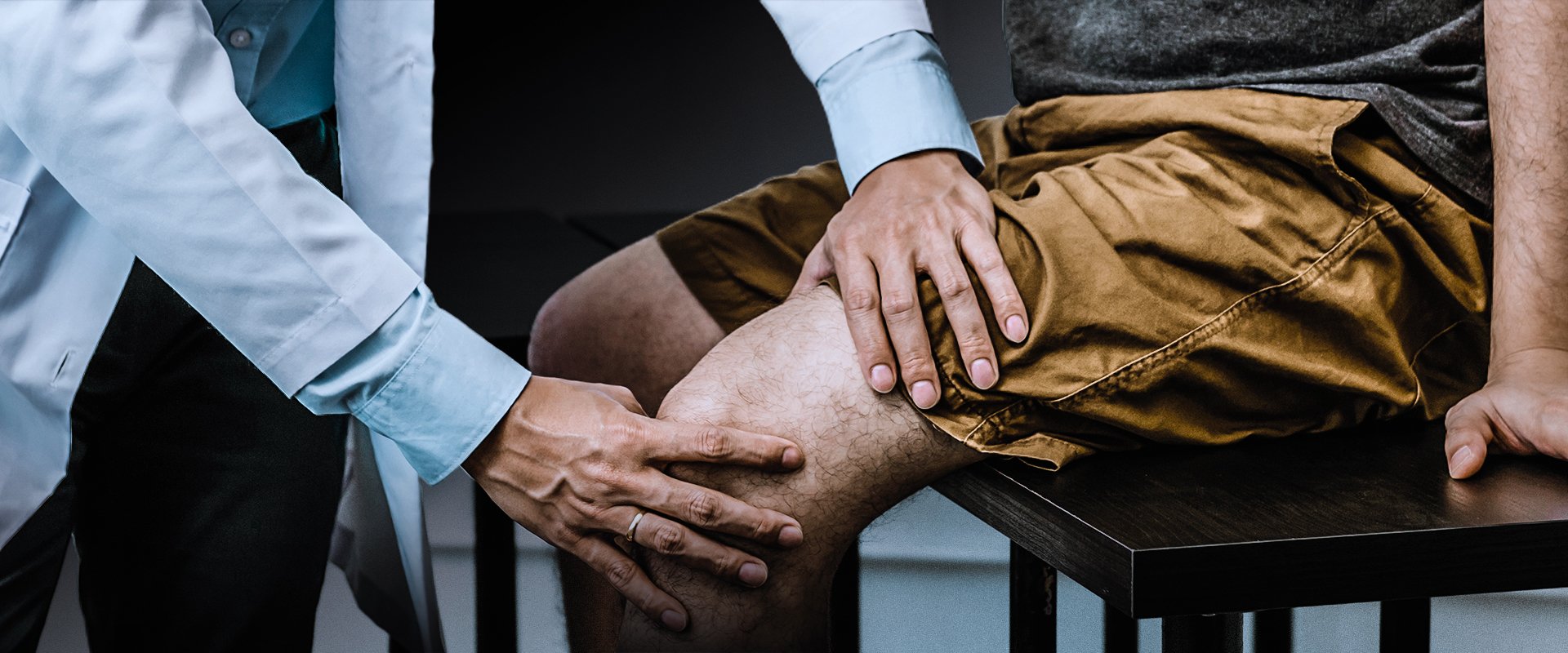
Physical Therapy for Patellofemoral Pain Syndrome
AT EVOLVE
Physical Therapy for Patellofemoral Pain Syndrome
HOW CAN PHYSICAL THERAPY HELP TREAT PATELLOFEMORAL PAIN SYNDROME?
Patellofemoral pain syndrome (PFPS) is a chronic condition consisting of pain arising from the patellofemoral joint (the kneecap) and nearby soft tissue. Pain can be felt on any aspect of the joint and tends to worsen with activity. Physical therapy is a conservative treatment approach to PFPS that aims to identify and address underlying contributing factors in order to reduce pain and limit recurrence of this condition.
WHAT DOES PHYSICAL THERAPY FOR PATELLOFEMORAL PAIN SYNDROME LOOK LIKE?
Like with all conditions, we will begin with an initial evaluation to better understand the pattern of symptoms you are experiencing as well as your goals and needs. We will ask you about the activities within your life that are being impacted by these symptoms as well as about your health history. Your therapist will then perform a physical exam focusing on the involved leg including assessing alignment, strength, range of motion, flexibility and motor control. They will also observe you performing functional tasks like walking, running or going down a step. With this information they can create an individualized treatment plan to address your symptoms. Your treatment program may involve hands-on manual therapy techniques performed by your therapist as well as movements and exercises performed by you in the clinic and at home.
WHAT IS PATELLOFEMORAL PAIN SYNDROME?
The knee joint is where the cartilage-covered ends of the thigh bone (femur) and lower leg bone (tibia) meet. The patella, also known as the kneecap, sits at the front of the joint in the femoral groove and lies within the tendon of the large quadriceps muscle acting as a fulcrum to increase the power of these large thigh muscles. The articulation between the patella and the femur is known as the patellofemoral joint. The patella slides up and down through the femoral groove as you flex and extend your knee. Cartilage on the underside of the patella and synovial fluid within the joint helps with this motion. The quadriceps tendon attaches to the top of the patella while the patellar tendon attaches at the bottom and anchors to the front of the tibia bone near the top. The capsule around the knee joint attaches to the patella all around it and the medial and lateral collateral ligaments which are on the inside and outside of the knee joint attach to the capsule.
PFPS is a chronic condition consisting of pain arising from the patellofemoral joint or surrounding tissues. Patients most commonly describe pain at the front of the knee but it could be anywhere around the patellofemoral joint. Typically PFPS is characterized by pain that worsens with activities such as, running, squatting or stair climbing and can sometimes be worsened by prolonged sitting. While trauma to the patella is a possible cause of PFPS, in most cases the cause for patellofemoral pain is multifactorial. The combined effect of factors such as muscle weakness or imbalance, biomechanical impairments, physical changes to the patella or joint along with overuse or overload of the patellofemoral joint is likely the cause of symptoms of PFPS. One of the reasons it is so beneficial to work with a physical therapist when experiencing PFPS is that the underlying cause(s) of one individual’s case of PFPS can be vastly different from another and therefore the treatment approaches would differ.
One of the main causes of PFPS is abnormal tracking of the patella in the femoral groove. If the patella tracks to one side more than another or is oriented differently than usual, more pressure may be placed on the underlying femur causing pain and discomfort with movement. This change in alignment or position could cause impairments in knee biomechanics or even muscular imbalances. Conversely, muscle imbalances or biomechanical impairments located away from the knee like high or flat arches, a tight IT band, the angle of the hip bones or mechanics of the hip may lead to abnormal tracking or positioning of the patella. As part of the initial examination your therapist will be on the lookout for these contributing factors to help guide their treatment plan.
End Injury Progression
Physical therapy for Patellofemoral Pain Syndrome has proven to prevent injury, slow and even stop pain issues, improve performance, and reverse injury progression in many cases.
Relieve Pain
The movements used in this technique can target your entire body helping you to manage discomfort and pain during the course of your physical therapy treatments.
Improve Range of Motion
Posture awareness is an important area to focus on due to the fact that certain positions may cause you further discomfort and pain.
Restore Mobility
You can regain mobility and flexibility by taking part in the stretches and exercises as prescribed by your physical therapist.
How Long Will Physical Therapy for Patellofemoral Pain Syndrome Last?
If you decide to work with a physical therapist to help with knee related issues, your entire treatment plan could consist of around 8-20+ different physical therapy sessions that will each last 60-90 minutes. Once you complete your customized physical therapy treatment plan, you will be able to continue to do the prescribed stretches and exercises utilized during your PT sessions yet in the comfort of your own home.
PHYSICAL THERAPY INTERVENTIONS FOR PATELLOFEMORAL PAIN SYNDROME
Treatments for PFPS will always be individualized to address a patient’s impairments but several physical therapy interventions have been shown to be helpful in the management of this condition:
Pain-free strengthening exercises for the hip and knee: strengthening that addresses muscles around both the hip and the knee is better than strengthening exercises for the knee alone. Your PT may recommend closed kinetic chain exercises wherein your feet are connected to the surface below (example: step up or squat) or they may recommend open chain exercises where the foot is free (example: straight leg raise). It will be important to find exercises that address your individual impairments which are pain-free.
Orthotics: if foot and arch positioning appear to be a significant factor in your PFPS, your PT may recommend orthotics to address these impairments which may reduce the load through the patellofemoral joint.
Taping: patellofemoral taping can offload the painful area of the joint and help with positioning of the patella in the femoral groove therefore reducing pain.
Manual therapy: addressing myofascial restrictions, trigger points and other restrictions in soft tissue may be important to address your symptoms. Your therapist may perform these interventions using their hands or may employ other tools like dry needling, foam rolling or IASTM.
Gait or running retraining: in some cases an individual may benefit from retraining of gait which may help reduce overload of the patellofemoral joint.
Functional training and restoration of activity: as underlying factors are addressed and symptoms subside, your therapist will incorporate more functional activities to ensure proper biomechanics, motor control and coordination when performing these activities. They will also educate you on how to return to your prior level of activity with an eye on prevention of PFPS in the future.
The symptoms of PFPS can surely be a pain but you should feel confident that the physical therapists at Evolve Physical Therapy know how to help. Call today to schedule an initial evaluation.
Mill Basin (located in Harbor Fitness)
6161 Strickland Ave
Brooklyn, NY 11234
Monday: 7am-8pm
Tuesday: 7am-8pm
Wednesday: 8am-5pm
Thursday: 7am-8pm
Friday: 8am-1pm
Park Slope (located in Harbor Fitness)
550 5th Ave.
Brooklyn, NY 11215
Monday: 9am-8pm
Tuesday: 8am-6pm
Wednesday: 9am-8pm
Thursday: 8am-6pm
Friday: 8am-3pm
Gravesend
372 Avenue U
Brooklyn, NY 11223
Monday-Thursday: 8am-8pm
Friday: 8am-3pm
Ready to take the next step to a healthier you?
Contact Us Today!
PHYSICAL THERAPY FOR PATELLOFEMORAL PAIN SYNDROME!
Need physical therapy for Patellofemoral Pain Syndrome?
Let our caring and compassionate physical therapists help you with relieving pain while getting you back on your feet comfortably.
Call now to schedule your first PT consultation free of charge.
Call: 1-718-258-3300







